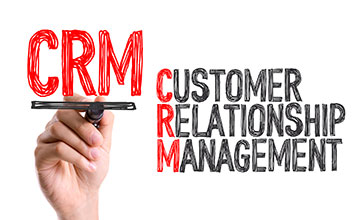Customer experience is crucial today to attract and retain customers. However, customers are getting confused amidst the noise generated by multiple sources of information and marketing via the internet. Enterprises therefore need a holistic strategy to offer a good experience and channels for direct engagement.
This strategy requires enterprises to be consistent in the way they communicate key messages, create new products, focus on the selling process, and provide post-sale support and service, amongst other factors.
Technology can give enterprises a big leg up in this area. Using customer relationship management (CRM) software, enterprises can improve the customer experience by boosting and fostering customer satisfaction and loyalty, thereby reducing customer churn and building more solid customer relationships. On top of that, CRM also provides businesses with a competitive advantage and increases sales and revenue.
CRM For Real-time Business Insights
Historically, CRM was a tool to collect, store and manage a database of customer information that contains names and contact details. In recent years, CRMs with new technology capabilities have advanced to a stage where they are now being leveraged to create and maintain relationships and interactions with potential and existing customers.
New CRMs have become part of digital transformation journeys as enterprises adopt a customer-centric focus. IT managers and CIOs at SMEs can start the CRM journey by gathering valuable information about customers, suppliers and other vital bits of business knowledge. Then they can consolidate all the information into one CRM system.
A CRM software offers three key pillars:
1. An integrated and centralised customer hub, consolidating all customer data, including contact details, service history, and social media activity to provide enterprises with a 360-degree view of each customer that is available in real-time.
2. Customer analytics: Insights from the analysis of customer interactions and history can be used to target special offers, resolve service issues, boost satisfaction, create personalised experiences and inform marketing strategies.
3. Marketing automation: CRM software automates processes like lead management, marketing project development, service tracking and post-sales service and support, all of which lead to improved efficiencies and better experiences.
The data consolidation will inevitably become a single source of truth and surface many insights, such as optimal daily sales performance, thereby allowing management to adjust strategies based on real-time trends. Sales teams can use the insights to stay on task, by setting up automatic workflow rules so that interactions with potential customers are followed up as planned. Relationships with vendors and other internal teams can also be tracked with the CRM software.

From contact history to customer feedback and social media activity, the CRM software can make sense of all this information in real-time to help enterprises leverage data and greatly improve their sales, marketing, customer service, and digital commerce activities. Business analysts, marketers and sales professionals can use this data to predict future strategies to qualify more prospects, convert leads, and improve the overall customer experience.
CRM Superpowered By AI and Machine Learning
CRM software has become more potent and robust with the addition of artificial intelligence (AI) and machine learning into the programming.
When an enterprise launches a product, for example, AI can be used to measure customer behaviour and their expectations for the said product. CRM with artificial intelligence allows enterprises to combine all strategies and technologies to streamline, manage and analyse customer interactions.
On top of that, machine learning technology can examine previous decisions to see which actions might lead to better decisions. The CRM can then make more informed decisions based on more recent customer interactions. It will also continuously learn and adapt based on updated strategies and the different outcomes from decisions that have been made.
CRM with machine learning can even identify and connect disparate data points to improve the customer experience. Enterprises could be alerted, for example, to the pain points that are tell-tale signs of sale cancellations, giving service agents time to proactively assist customers to complete transactions.
Overall, AI and machine learning improve the customer experience. Here are five ways these technologies are changing the way CRM software is being used:
1. Chatbots: Online conversational services like Alexa and Siri have made customers more receptive to non-human interactions with businesses. AI-powered chatbots are proliferating and functioning as intelligent and automated information service providers. Advanced chatbots can often understand a user’s intent, take the appropriate action to resolve the user’s problem, and perform a hand-off to a human agent if required. Chatbots streamline the engagement between customers and enterprises, with the express purpose of improving the customer service experience. They are thus well-placed to deliver business value.
2. Virtual assistants: Infusing AI into CRM allows for the emergence of virtual assistants for sales or marketing agents. These are usually remote virtual helpers who assist in conducting business operations like managing to-do lists, taking notes or automating client reactions, messages and follow-ups.
3. Automated Data Capturing: CRM tools are gathering and consolidating customer information from different services like WhatsApp and social media with almost no human intervention. Cutting out manual tasks for data entry creates efficiencies for enterprises, giving them more time and opportunities to connect with clients and perhaps create more income.
4. Advanced segmentation and lead customisation: AI and machine learning enable the CRM software to learn and take actions based on historical and current data to qualify leads. CRM software can also generate customised and personalised messages that are more likely to be delivered at the right time and on the right channel, creating the greatest impact with the customer.
5. Data analytics: Data consolidated in a CRM workflow is of nought if it is not used. With the data analytics capabilities afforded alongside AI and ML, the data will be cleaned, arranged and probed to enable enterprises to use it to improve customer understanding. This will also enable enterprises to introduce one-on-one, personalised encounters with every customer.
The CRM Of the Future for SMEs
Looking ahead, IT managers and CIOs at SMEs must be cognisant of the advancing capabilities of AI and ML. Future CRM infused with these two technologies will be able to automate more of the workflow process, even taking over tedious, time-consuming manual tasks that were the purview of white collar workers. Other areas poised for expansion include finer customer segmentation, programmatic advertising aimed at niche audiences, and greater personalisation.

AI will make personalisation more personal. “Personalised agents”, for example, will be able to discover the primary needs and wants of buyers for automated assistance. With enough data points to crunch, AI applications can even predict the next question the customer will ask or make recommendations ahead of the customer call so that service representatives can address issues proactively.
Today’s chatbots will shortly also become human-like. It will be able to use natural language processing, deep neural networks and conversational capabilities to comprehend consumer inquiries, while automatically providing an appropriate response.
As hardware advances and with the impending arrival of quantum computing, AI will be able to make sense of the reams and reams of data stored in a CRM software to drive improved business outcomes. It will offer greater granularity, identifying micro-patterns in user behaviour, often in real-time, to enhance selling opportunities.
Future CRM will also be integrated with social media platforms, collecting information from all sources and automatically analysing them. Social media lets enterprises connect with their audiences in real-time and build brand equity where prospects and customers are already spending their time. It also enables one-to-one marketing and the personal attention customers crave. CRM with social media will have a tremendous impact on the customer experience.
Integrating CRM with Back-end Operations
SAP CRM, as one example, is plugged into the SAP Business Suite, which includes supply chain management and enterprise resource planning capabilities, and other cloud-based services. Such close integration has several advantages. Enterprises get a single view of the customer and the ability to get user permission before their data is used to personalise their experience. Through this, they will also have a way to find out if customers are satisfied and happy.
SAP CRM offers enterprises a clear picture of their supply chains, since having customer information on the front-end will generate product demand data to help back-end operations like manufacturing and logistics. The product can also be integrated into other SAP and non-SAP systems too to achieve CRM objectives.
SAP CRM can help enterprises stay connected to customers and achieve a 360 degree-view of a customer, which enhances customer engagement and loyalty.

Its features include supporting all customer focused business areas like marketing, sales and service. It is available to customers across all channels, including a service centre and on the web and mobile. With CRM analytics it enables enterprises to gather and analyse their knowledge base to incorporate insights into operational processes and strategic decision-making.
Ultimately, with a robust and effective all-in-one CRM solution, enterprises will be able to do much more than simply sell – they will create long-term loyalty.
IT managers and CIOs must leverage CRM as a strategic business tool to optimise customer interactions and boost their understanding of customers’ needs and requirements. SMEs that can successfully leverage data and insights in real-time to provide an outsized customer experience are the ones that will win in today’s digital revolution.



